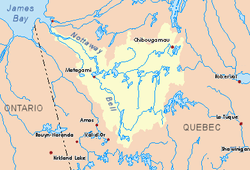Doda Lake
Doda Lake is a freshwater body of the southern part of Eeyou Istchee James Bay (municipality), in the administrative region of Nord-du-Québec, in the province of Quebec, in Canada. Doda Lake extends into the townships of Gradis, Machault, Du Guesglin and Royal.
| Doda Lake | |
|---|---|
 Watershed of Nottaway River | |
| Location | Eeyou Istchee Baie-James (municipality) |
| Coordinates | 49°24′04″N 75°11′40″W |
| Primary inflows |
|
| Primary outflows | Opawica River |
| Basin countries | Canada |
| Max. length | 29.4 kilometres (18.3 mi) |
| Max. width | 5.2 kilometres (3.2 mi) |
| Surface area | 76 kilometres (47 mi) |
| Surface elevation | 335 metres (1,099 ft) |
Forestry is the main economic activity of the sector. Recreational tourism activities come second with a navigable body of water of 64.8 kilometres (40.3 mi), including Father Lake (on southeast) and Françoise Lake (on north-west). The latter is formed by an enlargement of the Opawica River and has a dam built at its mouth.
The Doda Lake hydrographic slope is accessible via the R1051 Forest Road from the North, then branches off to the east to serve the peninsula (extending eastward on the 15 kilometres (9.3 mi) separating the Father Lake and Doda Lake.
The surface of Doda Lake is generally frozen from early December November to mid-May, however safe ice movement is generally from mid-November to mid-April.
Geography
Lake Doda has many bays, peninsulas and islands. The Opawica River (tributary of the Waswanipi River) runs westward through the northern part of Doda Lake.
Lake Doda draws supplies from the South on the Aigle River (Opawica River) and the Saint-Cyr River.
The mouth of Lake Doda is directly connected by a short strait to Lake Francoise. This mouth is located at the bottom of a bay in the Northwest to:
- 76.4 kilometres (47.5 mi) east of Lake Waswanipi;
- 109 kilometres (68 mi) south-west of downtown Chibougamau;
- 104.6 kilometres (65.0 mi) north-east of the village center of Lebel-sur-Quévillon;
- 112.3 kilometres (69.8 mi) northwest of Gouin Reservoir.[1]
The main hydrographic slopes near Lake Doda are:
- North side: Opawica River, Chibougamau River;
- East side: Aigle River (Opawica River), Surprise Lake (Roy River);
- South side: Aigle River (Opawica River), Saint-Cyr River, Hebert River;
- West side: Father Lake (Dora Lake, Opawica River.
Toponymy
Father Lake and Doda Lake (area of 76 square kilometres (29 sq mi)) appear to be two twins, having been considered as one entity by explorers. In the past, a large forest camp has been set up on its shores, where a depot has already welcomed teams of loggers and log drivers. An outfitter is operating for recreational and tourism activities including hunting and fishing.
An 1898 map identifies Father's and Doda's lakes separately. However, explorer Henry O'Sullivan considers on his 1900 map that these two lakes form a single entity that he says "Doda Sagahaigan or Father's L". Its original name Doda Sagaigan or Doda Sagandigan of Aboriginal origin of the Algonquin Nation meant "Father's Lake" or "Fathers Lake". This name has been abbreviated for ease of use and pronunciation. It could be an allusion to the ancient presence of missionaries.[2]
The name "Lac Doda" was officialized on December 5, 1968 by the Commission de toponymie du Québec when it was created.[3]
Notes and references
- Distances from the Department of Natural Resources Canada's Atlas of Canada (published on the Internet).
- Source: Names and Places of Quebec, a work of the Commission de toponymie du Québec, published in 1994 and 1996 in the form of a printed illustrated dictionary, and under that of a CD-ROM made by the company Micro-Intel, in 1997, from this dictionary.
- Commission de toponymie du Quebec - List of place names - Toponym: "Lac Doda"
See also
- Nottaway River, a watercourse
- Matagami Lake, a body of water
- Waswanipi River, a watercourse
- Opawica River, a watercourse
- Aigle River (Opawica River), a watercourse
- Saint-Cyr River, a watercourse
- Eeyou Istchee Baie-James (municipality), a municipality
- List of lakes in Canada